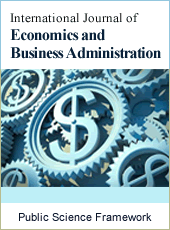International Journal of Economics and Business Administration
Articles Information
International Journal of Economics and Business Administration, Vol.1, No.2, Sep. 2015, Pub. Date: Jun. 24, 2015
Transatlantic Relations and Global Economic Governance: The TTIP in a Geopolitical Context
Pages: 55-58 Views: 4812 Downloads: 1521
[01]
Nuno Gama de Oliveira Pinto, Center for International Studies, IUL –Team Europe/European Commission – Lisbon, Portugal.
The Transatlantic Trade and Investment Partnership (TTIP) aims to open up trade and investment between the European Union (EU) and the United States (US), which together make up 40% of global economic output. The EU and the US have their eyes on more than just removing the remaining low tariffs, which currently stand on average at around just 4%. The main hurdles to trade comprise so-called “behind the border” regulations, “non-tariff barriers” and red tape. Up to 80% of the gains from a trade deal are expected to come from the lower costs of bureaucracy and regulations arising from a deal, as well as from opening up trade in services and public procurement (purchases of goods and services by governments and local authorities). The key phrase is regulatory cooperation, creating similar regulations from the outset, rather than having to try to adapt them later. A more integrated transatlantic marketplace would respect each side's right to regulate the protection of health, safety and the environment at a level it considers appropriate. But by aligning their domestic standards, both sides could set the benchmark for developing global rules, benefiting EU and US exporters, and the wider global trading system.
TTIP, International Trade, Investment Protection, European Fund for Strategic Investments, Project Finance, Private Funding
[01]
Baldwin, Richard E. & Charles Wyplosz (2012). The Economics of European Integration. Maidenhead: McGraw-Hill.
[02]
Bale, Tim (2013). European Politics: A Comparative Introduction. Basingstoke: Palgrave Macmillan.
[03]
Conti, Joseph A. (2011). Between Law and Diplomacy: The Social Contexts of Disputing at the World Trade Organization. Redwood: Stanford University Press.
[04]
Daniels, Joseph P. & David D. Van Hoose (2013). International Monetary and Financial Economics. New York: Pearson Education.
[05]
Feenstra, Robert C. (2004). Advanced International Trade: Theory and Evidence. New Jersey: Princeton University Press.
[06]
Gandolfo, Giancarlo (2014). International Trade Theory and Policy. New York: Springer Publishing.
[07]
Goldin, Ian & Kenneth Reinert (2012). Globalization for Development: Meeting New Challenges. Oxford: Oxford University Press.
[08]
Herrmann, Ulrike (2014). Project of the Powerful: TTIP Transatlantic Trade and Investment Partnership. Brussels: Rosa Luxemburg Foundation.
[09]
Heywood, Andrew (2011). Global Politics. Basingstoke: Palgrave Macmillan.
[10]
Hix, Simon (2011). The Political System of the European Union. Basingstoke: Palgrave Macmillan.
[11]
Hufbauer, Gary C. & Kati Suominen (2010). Globalization at Risk: Challenges to Finance and Trade. New Haven: Yale University Press.
[12]
Kotzias, Nikos & Petros Liacouras (2006). EU-US Relations: Repairing the Transatlantic Rift. Basingstoke: Palgrave Macmillan.
[13]
Mansfield, Edward D. & Helen V. Milner (2012). Votes, Vetoes, and the Political Economy of International Trade Agreements. New Jersey: Princeton University Press.
[14]
McCormick, John & Jonathan Olsen (2013). The European Union: Politics and Policies. Boulder: Westview Press.
[15]
Nello, Susan (2011). The European Union: Economics, Policies and History. Maidenhead: McGraw-Hill Education.
[16]
Oatley, Thomas (2012). International Political Economy. New York: Pearson Education.
[17]
Pinto, Nuno G. O. (2003), “Instrumentos Governamentais Nacionais e Comunitários de Apoio ao Comércio Internacional”. In José António Porfírio (ed.), Gestão Financeira Internacional (pp. 151-176). Lisboa: Editora Rei dos Livros.
[18]
Rodrik, Dani (2011). The Globalization Paradox: Democracy and the Future of the World Economy. New York: W. W. Norton & Company.

ISSN Print: 2381-7356
ISSN Online: 2381-7364
Current Issue:
Vol. 7, Issue 4, December Submit a Manuscript Join Editorial Board Join Reviewer Team
ISSN Online: 2381-7364
Current Issue:
Vol. 7, Issue 4, December Submit a Manuscript Join Editorial Board Join Reviewer Team
| About This Journal |
| All Issues |
| Open Access |
| Indexing |
| Payment Information |
| Author Guidelines |
| Review Process |
| Publication Ethics |
| Editorial Board |
| Peer Reviewers |


